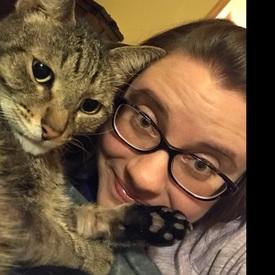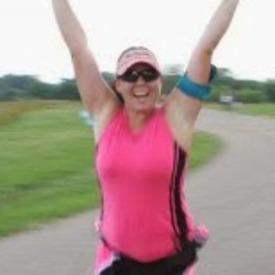'Water helps weight loss' - A myth apparently

emma155
Posts: 152 Member
Apparently drinking 2 litres of water a day only helps weight loss because its makes you feel fuller meaning it helps you eat less.
Your fat cells need water to breakdown fat however apprently you dont need 2 litres of water a day for this, and likely that your intake is enough water for this to happen already.
Any thoughts?
Im drinking 2 litres a day just because it's good for you and if it does help weight loss thats a bonus!
Your fat cells need water to breakdown fat however apprently you dont need 2 litres of water a day for this, and likely that your intake is enough water for this to happen already.
Any thoughts?
Im drinking 2 litres a day just because it's good for you and if it does help weight loss thats a bonus!
0
Replies
-
I drink when thirsty. I get really thirsty pretty much all the time so I drink about 8 liters of water a day. Yesterday I went through over 10 liters.0
-
Yes, it is a myth! I weighed myself this morning and then I drank 2 liters of water. I weighed myself again and I gained 4 pounds!!! :mad:0
-
Water helps you break down nutrients. But increasing water above and beyond that of being hydrated will do nothing for you in terms of weight loss. I always laugh when people say drink more water. Calories is for weight loss, not water.0
-
Yes, it is a myth! I weighed myself this morning and then I drank 2 liters of water. I weighed myself again and I gained 4 pounds!!! :mad:
The horror!
Personally, I would be dehydrated on two liters, and dehydration leads to sluggishness. However, I seem to need an inordinate amount of water to stay hydrated, as shown by high levels of iron when I am being tested for anemia.0 -
Yes, it is a myth! I weighed myself this morning and then I drank 2 liters of water. I weighed myself again and I gained 4 pounds!!! :mad:
^^^^^^^
i dont think it works that quick lol0 -
I have read you should drink 1/2 your body weight in oz of water. Example: a person weighing 150lbs/2=75 should drink 75 oz of water to hyrdate their body. Who knows how much truth there is to that but there is nothing wrong with drinking plenty of water. Who knows if it helps with weight loss. The way I look at it is, if I'm not drinking water, I'll probably be drinking something with calories instead, so with that theory, yes water helps with weight loss!0
-
Water helps you break down nutrients. But increasing water above and beyond that of being hydrated will do nothing for you in terms of weight loss. I always laugh when people say drink more water. Calories is for weight loss, not water.
I say "drink more water" as in drink water instead of soda or sweet tea or other empty calorie, sugary beverages.0 -
There is a basic test for this. If your urine is very pale yellow to clear, you are probably getting enough water to be hydrated.0
-
I try to drink at least 4 liters a day...I can tell a huge difference in how I feel, and look (skin etc)0
-
I drink water to avoid death not to lose weight.0
-
I started drinking to help me feel full. I'm going to keep drinking to keep my skin beautiful and clear. There are so many other benefits to drinking water than just the idea that it may or may not help you lose weight0
-
Drinking more water may lead to weight loss, but not fat loss. The weigh you may lose would be water weight. If you are well hydrated there is less of a chance of your body retaining any extra water. So if you are retaining water now, drinking water will help you lose weight (water weight) but not fat.0
-
Yes, it is a myth! I weighed myself this morning and then I drank 2 liters of water. I weighed myself again and I gained 4 pounds!!! :mad:
this made me chuckle!!
But I have my 3 liters a day and I feel so much better for it0 -
Water helps your body do everything, including lose weight (if you are also exercising and dieting for this to happen). There is of course a point in which you will be taking in an amount that will be "too much".
There is also such a thing as water loading, where if you increase your water intake a lot, in a short amount of time and then drastically drop it quickly you will shed a water weight quickly. Only a temporary decreasd used often by athletes who need to make weight.
Personally I have water loaded before and it works, and I also typically drink a gallon of water a day and it does not cause me to gain weight. Though *initially* you may see an increased weight gain bc your body may not be used to the amount of water you are giving it.0 -
I drink water to avoid death not to lose weight.
This and also to keep my internals functioning well.0 -
I drink when thirsty. I get really thirsty pretty much all the time so I drink about 8 liters of water a day. Yesterday I went through over 10 liters.
wow, 10 liters = 330 oz. Don't you float away?0 -
I drink 40-70 ounces of water a day and it works for me. (I guess I do that half-your-body weight in water without even knowing it when I get to 60 ounces).0
-
Actually, it does work that quickly. The water is in one's stomach, so it's included in the weight on the scale. And as the saying goes, "A pint's a pound, the world 'round." 2 liters of water is approximately 4 pints, which is 4 pounds.Yes, it is a myth! I weighed myself this morning and then I drank 2 liters of water. I weighed myself again and I gained 4 pounds!!! :mad:
^^^^^^^
i dont think it works that quick lol0 -
i thought the whole point was that water stopped you from being as hungry. wasn't it?0
-
Yes, it is a myth! I weighed myself this morning and then I drank 2 liters of water. I weighed myself again and I gained 4 pounds!!! :mad:
So basically, you drank approximately 66-68 oz of water which is the equivalent of 4.25 pounds if one pound is 16 oz. Your weight gain from water was exactly what it should have been.0 -
Well....if you think about it water does help with weight loss. Just not in the way you think....
If you drink water, you are replacing all those nasty sugar filled, carbonated big butt creating drinks with something natural and healthy...which means you will cut back on the nasty empty calories and you won't end up a diet soda addict.
But, in terms of water actually helping directly with weightloss....no.0 -
Water is good for us and a basic need, yes, but the amount of water we need is often vastly overstated, especially when it comes to weight loss advice.
Keep yourself hydrated. Drink mostly water, but other liquids count too. We get lots of water from the food we eat, even.0 -
Actually, it does work that quickly. The water is in one's stomach, so it's included in the weight on the scale. And as the saying goes, "A pint's a pound, the world 'round." 2 liters of water is approximately 4 pints, which is 4 pounds.Yes, it is a myth! I weighed myself this morning and then I drank 2 liters of water. I weighed myself again and I gained 4 pounds!!! :mad:
^^^^^^^
i dont think it works that quick lol
that saying is silly. the world is flat0 -
Yes, it is a myth! I weighed myself this morning and then I drank 2 liters of water. I weighed myself again and I gained 4 pounds!!! :mad:
So basically, you drank approximately 66-68 oz of water which is the equivalent of 4.25 pounds if one pound is 16 oz. Your weight gain from water was exactly what it should have been.
Psssst, I bet he did the math, not the experiment.0 -
I think the trick is then you have to get up and go to the bathroom more when you drink all that water, making you burn more calories for each trip. :]0
-
Be cautious when drinking large amounts of water. The sodium levels in your body become diluted and weakened, causing all kinds of problems.
Symptoms of hyponatremia include nausea and vomiting, headache, confusion, lethargy, fatigue, appetite loss, restlessness and irritability, muscle weakness, spasms, or cramps, seizures, and decreased consciousness or coma. The presence and severity of symptoms are associated with the level of serum sodium, with the lowest levels of serum sodium associated with the more prominent and serious symptoms. However, emerging data suggest that mild hyponatremia (serum sodium levels at 131 mEq/L or above) is associated with numerous complications and undiagnosed symptoms.[2]
Many medical illnesses, such as congestive heart failure, liver failure, renal failure, or pneumonia may be associated with hyponatremia. These patients frequently present because of primary disease symptomatology and are diagnosed after presenting due to manifestations of other medical issues.
Neurological symptoms often show for extremely low levels of sodium. When sodium levels in blood become too low, excess water enters cells and causes the cells to swell. Swelling in the brain is especially dangerous because the brain is confined by the skull and is unable to expand. The disorder in the brain caused by hyponatremia is called hyponatremic encephalopathy, and accounts for symptoms such as headache, nausea, vomiting and confusion, but can also present with seizures, respiratory arrest and non-cardiogenic pulmonary edema.[3] Neurological symptoms most often are due to very low serum sodium levels (usually <115 mEq/L), resulting in intracerebral osmotic fluid shifts and brain edema. This neurological symptom complex can lead to tentorial herniation with subsequent brain stem compression and respiratory arrest, resulting in death in the most severe cases. The severity of neurological symptoms correlates with the rapidity and severity of the drop in serum sodium. A gradual drop, even to very low levels, may be tolerated well if it occurs over several days or weeks, because of neuronal adaptation. The presence of underlying neurological disease, like a seizure disorder, or non-neurological metabolic abnormalities, also affects the severity of neurologic symptoms.0 -
I don't think it has much to do with weight loss but certainly does for health. If you are working out hard, you need to replenish the fluids. Also, if you are dieting heavy and don't drink a lot of water, it can really mess up your bodily functions. Need to keep things..er...moving.0
-
I drink lots of water to "flush" my kidneys, which in turn lowers the uric acid level in my blood, which helps prevent gout outbreaks. I was prescribed medicine for this but did not like the side effects so I try to stay hydrated, watch what I eat and stay active so I don't have any nasty gout outbreaks. The joint deterioration is a huge concern of mine since I already have arthritis in my feet, hands and back so I am trying to extend the time until I absolutely have to take daily medications or have the surgery on my feet for the flexible flat foot and bunions.0
-
Don't get all this??? I think it takes A LOT OF WATER to have an issue. My mother died in Oct. She had Congestive Heart Failure, was on water pills (basically having too much sodium in her body...told by doctor to watch that intake. So, I would think the decrease in sodium diet would be more beneficial. She was on MFP and tried a little, but it was all a little too later.
I believe water intake helps with a lot of things...yes..in the long run if kept up weight loss to an extent.Be cautious when drinking large amounts of water. The sodium levels in your body become diluted and weakened, causing all kinds of problems.
Symptoms of hyponatremia include nausea and vomiting, headache, confusion, lethargy, fatigue, appetite loss, restlessness and irritability, muscle weakness, spasms, or cramps, seizures, and decreased consciousness or coma. The presence and severity of symptoms are associated with the level of serum sodium, with the lowest levels of serum sodium associated with the more prominent and serious symptoms. However, emerging data suggest that mild hyponatremia (serum sodium levels at 131 mEq/L or above) is associated with numerous complications and undiagnosed symptoms.[2]
Many medical illnesses, such as congestive heart failure, liver failure, renal failure, or pneumonia may be associated with hyponatremia. These patients frequently present because of primary disease symptomatology and are diagnosed after presenting due to manifestations of other medical issues.
Neurological symptoms often show for extremely low levels of sodium. When sodium levels in blood become too low, excess water enters cells and causes the cells to swell. Swelling in the brain is especially dangerous because the brain is confined by the skull and is unable to expand. The disorder in the brain caused by hyponatremia is called hyponatremic encephalopathy, and accounts for symptoms such as headache, nausea, vomiting and confusion, but can also present with seizures, respiratory arrest and non-cardiogenic pulmonary edema.[3] Neurological symptoms most often are due to very low serum sodium levels (usually <115 mEq/L), resulting in intracerebral osmotic fluid shifts and brain edema. This neurological symptom complex can lead to tentorial herniation with subsequent brain stem compression and respiratory arrest, resulting in death in the most severe cases. The severity of neurological symptoms correlates with the rapidity and severity of the drop in serum sodium. A gradual drop, even to very low levels, may be tolerated well if it occurs over several days or weeks, because of neuronal adaptation. The presence of underlying neurological disease, like a seizure disorder, or non-neurological metabolic abnormalities, also affects the severity of neurologic symptoms.0 -
The common belief that people should drink eight glasses or two litres of water a day is a 'myth' that needs debunking, a Melbourne academic says.
The new Australian recommendations suggest that an adequate daily fluid intake is about 2.8 litres for women and 3.4 litres for men.
However, this includes fluid found in food and beverages.
La Trobe University lecturer Spero Tsindos said that people could get their daily fluid intake from fruit, vegetables, juices and even tea and coffee.
"If you're feeling thirsty then drink by all means a beverage. It doesn't have to be water", Tsindos was quoted as writing in the Australian and New Zealand Journal of Public Health.
"I'm not saying you shouldn't drink water. I'm saying the need to drink two litres of water on a regular basis is a complete myth."
"We should be telling people that beverages like tea and coffee contribute to a person's fluid needs and despite their caffeine content, do not lead to dehydration", Tsindos said.
He said that drinking a large quantity of water in one sitting to reach the daily intake level was pointless because it would not be distributed where it was needed. It would just dilute the urine.
Drinking large amounts of water to lose weight would not work either without a low-calorie diet, he emphasised.0
This discussion has been closed.
Categories
- All Categories
- 1.4M Health, Wellness and Goals
- 398.2K Introduce Yourself
- 44.7K Getting Started
- 261K Health and Weight Loss
- 176.4K Food and Nutrition
- 47.7K Recipes
- 233K Fitness and Exercise
- 462 Sleep, Mindfulness and Overall Wellness
- 6.5K Goal: Maintaining Weight
- 8.7K Goal: Gaining Weight and Body Building
- 153.5K Motivation and Support
- 8.4K Challenges
- 1.4K Debate Club
- 96.5K Chit-Chat
- 2.6K Fun and Games
- 4.8K MyFitnessPal Information
- 12 News and Announcements
- 21 MyFitnessPal Academy
- 1.6K Feature Suggestions and Ideas
- 3.2K MyFitnessPal Tech Support Questions






















